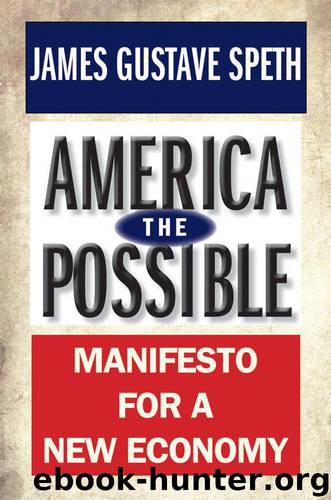America the Possible: Manifesto for a New Economy (American Crisis) by Speth James Gustave

Author:Speth, James Gustave [Speth, James Gustave]
Language: eng
Format: epub, mobi
Publisher: Yale University Press
Published: 2012-09-24T21:00:00+00:00
Transforming Communities
It has been said that the nation-state is too big for the little things and too little for the big things. That is true if we think of “big” and “little” in terms of the geographic scale. But the things that happen below the national level are certainly not “little” to most of us. As E. F. Schumacher said in Small Is Beautiful, “People can be themselves only in small comprehensible groups.”85 We lead local lives, and the things that happen in our communities—and here I use communities to include our neighborhoods, towns, cities, and regions—are BIG.
And what has been happening locally for some decades now is that many, many American communities are being hollowed out under repeated assaults from the same economic and political forces that have given rise to our other grave challenges. Giant corporations come and go at will, taking good jobs with them and bringing in fast-food and big-box ones. Working families are compelled to move from place to place in search of jobs. States compete for what’s left of American manufacturing by offering expensive incentives and enacting anti-union “right-to-work” laws. Tax bases erode and local services, education, and public amenities are cut.
In Making a Place for Community, Thad Williamson and his colleagues point to the “decay of civic life and community attachment in the United States,” and they worry about our country’s failure to respond to these trends: “Indeed, our policies . . . often seem designed explicitly to undermine the economic basis of stable communities. While serious observers know this, few want to confront or alter this reality in a direct fashion. Instead, discussions of how to revitalize community (and communities) too often come with this caveat: We want to rebuild community without seriously altering the political and economic policies that contradict this goal. The continued evasion of central political-economic questions is a dead end for those concerned with reconstructing civil and community life in the twenty-first century.”86
Remarkably, some national leaders in the United States have noticed these trends in community decline and have, in effect, blessed them. The 1980 national commission on A National Agenda for the Eighties concluded that “the economic health of our nation’s communities ultimately depends on the health of our nation’s economy. Federal efforts to revitalize . . . areas through [public policies] . . . concerned principally with the health of specific places will inevitably conflict with efforts to revitalize the larger economy.” Instead of policies seeking to sustain communities, the commission urged policy efforts that do “not discourage the deconcentration and dispersals of industry and households,” because these trends flow from natural workings of the market.87 Community, like much else, is sacrificed for the sake of economic growth.
Making a Place for Community documents the high costs of neglect of our communities. First, there is the economic loss when “sunk private and public investments in infrastructure, housing, commercial buildings, education, utilities, and other public goods” are partially abandoned and must be replaced elsewhere. There are also costs to democracy and good governance.
Download
America the Possible: Manifesto for a New Economy (American Crisis) by Speth James Gustave.mobi
This site does not store any files on its server. We only index and link to content provided by other sites. Please contact the content providers to delete copyright contents if any and email us, we'll remove relevant links or contents immediately.
| Anarchism | Communism & Socialism |
| Conservatism & Liberalism | Democracy |
| Fascism | Libertarianism |
| Nationalism | Radicalism |
| Utopian |
The Secret History by Donna Tartt(16725)
The Social Justice Warrior Handbook by Lisa De Pasquale(11507)
Thirteen Reasons Why by Jay Asher(7834)
This Is How You Lose Her by Junot Diaz(5830)
Weapons of Math Destruction by Cathy O'Neil(5081)
Zero to One by Peter Thiel(4869)
The Myth of the Strong Leader by Archie Brown(4810)
Promise Me, Dad by Joe Biden(4479)
Beartown by Fredrik Backman(4466)
How Democracies Die by Steven Levitsky & Daniel Ziblatt(4450)
Stone's Rules by Roger Stone(4440)
The Fire Next Time by James Baldwin(4375)
100 Deadly Skills by Clint Emerson(4110)
A Higher Loyalty: Truth, Lies, and Leadership by James Comey(4061)
Rise and Kill First by Ronen Bergman(4049)
The David Icke Guide to the Global Conspiracy (and how to end it) by David Icke(3915)
The Farm by Tom Rob Smith(3896)
Secrecy World by Jake Bernstein(3811)
The Doomsday Machine by Daniel Ellsberg(3760)
